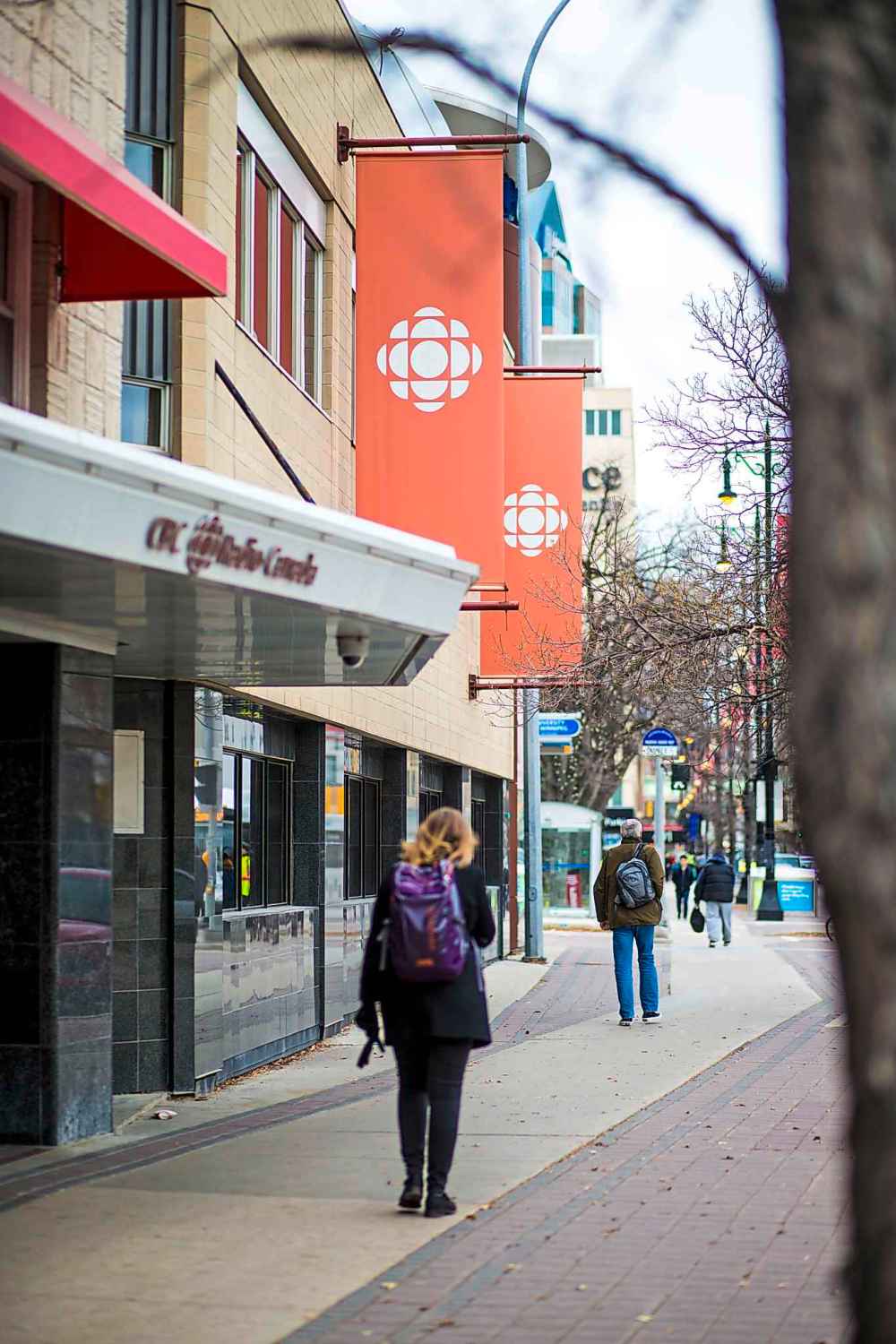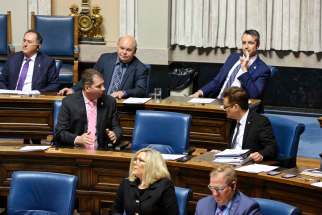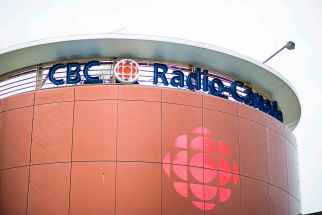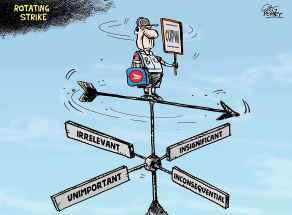Publicly funded CBC to air murder mystery, pastry-making instead of election results
Read this article for free:
or
Already have an account? Log in here »
To continue reading, please subscribe:
Monthly Digital Subscription
$0 for the first 4 weeks*
- Enjoy unlimited reading on winnipegfreepress.com
- Read the E-Edition, our digital replica newspaper
- Access News Break, our award-winning app
- Play interactive puzzles
*No charge for 4 weeks then price increases to the regular rate of $19.00 plus GST every four weeks. Offer available to new and qualified returning subscribers only. Cancel any time.
Monthly Digital Subscription
$4.75/week*
- Enjoy unlimited reading on winnipegfreepress.com
- Read the E-Edition, our digital replica newspaper
- Access News Break, our award-winning app
- Play interactive puzzles
*Billed as $19 plus GST every four weeks. Cancel any time.
To continue reading, please subscribe:
Add Free Press access to your Brandon Sun subscription for only an additional
$1 for the first 4 weeks*
*Your next subscription payment will increase by $1.00 and you will be charged $16.99 plus GST for four weeks. After four weeks, your payment will increase to $23.99 plus GST every four weeks.
Read unlimited articles for free today:
or
Already have an account? Log in here »
Hey there, time traveller!
This article was published 22/10/2018 (2609 days ago), so information in it may no longer be current.
OTTAWA — When the polls closed across Ontario this evening after voters cast ballots for their mayors and councillors, CBC television airied Murdoch Mysteries — a prime-time whodunit in place of a who-won-it.
And when the polls close at 8 p.m. Wednesday in Manitoba, the national broadcaster will serve up a baking show to local voters who may otherwise hunger for election results.
This week, the public broadcaster is shunning its raison d’etre by putting most of its election-night coverage on Facebook and other online platforms, none of which are part of the Crown corporation’s mandate.

The CBC cited “commitments to our advertisers” in deciding which “competing priorities” shape its schedule. That’s part of a years-long trend that has the CBC putting out less original content over its airwaves, and reaching fewer regions in Canada.
“It kind of calls into question the purpose of a public broadcaster at all,” said Jeffrey Dvorkin, who was CBC Radio’s managing editor for most of the ’90s. “It sends a very strange message to all Canadians that the CBC will consider the market realities before it will consider the democratic values.”
Why CBC doesn’t reach analogue televisions
OTTAWA — In wide swaths of the country, Canadians have to pay to watch the CBC.
Most Winnipeggers will recall the September 2011 switchover, when Canada upgraded from analogue to digital transmitters. Canadians had to scrap “bunny-ears” antennae for either a newer rooftop unit, or switch to paid options like cable or satellite.
OTTAWA — In wide swaths of the country, Canadians have to pay to watch the CBC.
Most Winnipeggers will recall the September 2011 switchover, when Canada upgraded from analogue to digital transmitters. Canadians had to scrap “bunny-ears” antennae for either a newer rooftop unit, or switch to paid options like cable or satellite.
But outside major cities, CBC did not upgrade 600 of its transmitters.
One month before the old antennae connection was made obsolete, the public broadcaster successfully asked the CRTC to maintain analogue transmission in 22 markets. A year later, during a round of budget cuts, CBC cancelled plans to upgrade those remaining transmitters.
Since 2012, that’s left wide swaths of Canada where CTV and Global reach households, but not the taxpayer-funded CBC.
University of Calgary communication professor Gregory Taylor has analyzed viewing statistics for hockey games and electoral debates, both of which draw more viewers on television broadcasts than online or mobile streaming.
“In Canada there remain clear signs of life in traditional broadcasting, and the online world may pose a whole new set of challenges for the CBC,” Taylor wrote in his 2016 study Dismantling the public airwaves.
“Traditional broadcasting has proven surprisingly resilient in the face of new distribution technologies.”
Taylor contends that the CBC is “too far ahead of the curve in the digital environment,” while neglecting far-flung citizens who can’t afford a satellite subscription.
He noted that European broadcasters successfully resisted a similar digital-antenna upgrade in 2015.
–Dylan Robertson
In a September interview, CBC/Radio-Canada president Catherine Tait made it clear her network sees broadcasting as a secondary duty.
“Right now we are managing legacy assets, which is television and radio,” she said, “but we are also seeing a huge shift in terms of consumer behaviour. Young Canadians are online; they’re on mobile, and we’re delivering them news.”
CBC’s own staff are questioning the decision. Employees at its Ottawa station said in a letter that “The decision smacks of a kind of egregious elitism,” according to the Globe and Mail.
On Wednesday’s municipal election night in Manitoba, the CBC will air a 30-minute recap starting at 11 p.m., much like it will later this evening in Ontario.
By comparison, private broadcaster CTV News Winnipeg will have two hours of prime-time coverage.
The CBC approach runs counter to the 1991 Broadcasting Act, which sets out the network’s mandate to “provide radio and television services” that reflect the country. Instead, the CBC is doubling down on digital.
This season, CBC is launching three podcasts. It’s maintaining a comedy YouTube channel whose videos seldom crack 4,000 views. At the same time, it cancelled the afternoon show On The Money — ending three decades of on-air business reporting, citing the the need to fund digital services.
“I think they’re in some sort of survival mode,” said Dvorkin, who now directs the University of Toronto journalism program.
“They’ve grabbed onto digital as a saviour — but it can be a villain as much as a saviour.”
The CBC mandate doesn’t mention any digital offerings, but the Broadcasting Act says CBC “programming” should “be made available throughout Canada by the most appropriate and efficient means and as resources become available for the purpose.”
That 1991 mandate sets out a contradiction, making it unclear whether CBC ought to go beyond radio and TV, according to Daniel Bernhard, director of the advocacy group Friends of Canadian Broadcasting.
“There are all sort of other dynamics that have really, really shifted. And CBC’s mandate has not been meaningfully updated,” he said.
Bernhard sees an absence of federal direction, leaving the CBC to push its digital offerings to the forefront. Its strategic plan, A Space for Us All, aims to have half of Canadians using CBC digital services on a monthly basis by 2020, a goal it’s already reached for the millennial demographic.
That plan was rolled out in 2014, right after the CBC lost both the prestige and ad revenue of Hockey Night in Canada. It committed the CBC to shifting “from public broadcaster to public media company.”
Two years prior, the CBC dropped its plans to upgrade a wide swath of its transmitters for digital antennas. Since then, Canadians have had to pay for cable or satellite connections to watch CBC in almost all areas outside of major cities — places such as Brandon, Thompson or London, Ont.
Tait told her own network’s Vancouver radio show, The Early Edition, that CBC is simply responding to market demand.
But this free content infuriates newspaper publishers and executives from digital media start-ups, who have complained to Parliament that the CBC is undercutting their business case.

Data compiled by the National NewsMedia Council, which advocates for government subsidies, show daily newspapers’ total revenue has consistently dropped over the past decade, reaching $1.6 billion in 2017 — converging with CBC’s total revenues for that fiscal year.
The founder of the Parliament Hill news site iPolitics has called the CBC “an uber-predator,” a viewpoint that resonated with the Conservatives’ recent heritage critic, Peter Van Loan.
“We don’t subsidize (the CBC) to compete with these private outlets; we subsidize them to deliver things that would not otherwise be delivered by private outlets,” he said, citing arts and sports as examples.
“The CBC needs to focus on what its mandate is right now,” Van Loan said, shortly before his retirement last month. He also wants more clarity on how far the CBC has treaded into the digital space.
The public broadcaster doesn’t actually track how many of its employees focus exclusively on digital content, nor how much taxpayer funding goes to those offerings, according to freedom-of-information requests.
“Our mandate is to serve Canadians. Increasingly that is through digital,” wrote the corporation’s spokesman, Douglas Chow.
In June, the federal Liberals tasked an arm’s-length panel with reviewing CBC’s mandate, as part of a sweeping reform that also touches on telecom rules — but the panel’s report isn’t due until January 2020, three months after the next federal election.
NDP heritage critic Pierre Nantel said that’s way too long to wait for a new mandate when newsrooms are closing on an almost-monthly basis. “It’s totally unacceptable that this government is not moving on obvious things,” he said.
Nantel said the review ought to consider changing the CBC’s funding structure.
Does the CBC exist to fill market gaps?
OTTAWA — With Canada increasingly urbanizing, the government will also face competing visions over whether the CBC ought to provide news to the most people, or focus on smaller, underserved communities.
James Baxter, the founder of the news site iPolitics, believes the CBC exists for remote and rural coverage.
OTTAWA — With Canada increasingly urbanizing, the government will also face competing visions over whether the CBC ought to provide news to the most people, or focus on smaller, underserved communities.
James Baxter, the founder of the news site iPolitics, believes the CBC exists for remote and rural coverage.
“The CBC was created with two purposes: to provide a bulwark against American cultural imperialism, and to fill a void in rural areas where commercial news was not viable,” he told Parliament in September 2016.
But Dwayne Winseck, a Carleton University professor specializing in media concentration, said the CBC mandate has never focused on filling in gaps where the market fails.
“That’s not really what the CBC is supposed to be about. That’s a particular model that some people would like to see for the CBC,” he said.
“CBC is a national public-service media provider and so its mandate covers the country as a while. And so it’s not just about filling markets; it’s about really constituting what is a public service.”
CBC/Radio-Canada president Catherine Tait said in a September interview that her journalists’ No. 1 priority is specific to their areas: “Local and regional CBC content, I would say across the board, is the heart of the organization.”
Still, rural Canadians have been left wondering how deep that commitment runs.
When the Harper government put the CBC’s funding in 2009, the Crown corporation scaled back jobs across the country, but wanted to close entirely its northern bureaux in Thompson, Man. and La Ronge, Sask. The CBC relented after outcry from by impacted communities and MPs like Niki Ashton.
It’s also unclear whether CBC has been cannibalizing news jobs in Canada’s largest cities, or having the opposite effect of backstopping a decline in local news coverage.
Ottawa, for example, counts almost a million residents. Postmedia merged both the city’s dailies into one newsroom in January 2016, and the company has just one general-assignment reporter working Sunday for both the Ottawa Sun and Ottawa Citizen.
Meanwhile, the local CBC bureau has a handful of staff working that day to cover news around Ottawa.
Carleton University journalism professor Christopher Waddell is glad the public broadcaster keeps multiple eyes on his city, but understands the criticism that CBC might have been undercutting both newspapers’ readership, thus contributing to the newsroom merger. “I can see both sides of it.”
—Dylan Robertson
Taxpayers gave the CBC $1.2 billion in the fiscal year that ended in March. But that’s much lower than most wealthy countries fund public broadcasters on a per-capita basis, a variety of sources indicate. Bernhard argues CBC’s revenue has consistently declined since 1984 when adjusting for inflation.
In 2003, a parliamentary committee recommended Ottawa provide CBC with stipends in blocks of three to five years, to better plan how to achieve its mandate. In Britain, the BBC receives a block of funding and a new mandate every 10 years, called the Royal Charter.
Dvorkin believes the CBC’s mission to reflect the country is being undermined by short-term budget cycles, leaving the corporation battling private broadcasters for advertising dollars.
“People within the CBC say that the pressure is on to aggregate an audience, to find that elusive 30- to 49-year-old demographic, to do all the things that commercial broadcasters do,” he said.
To him, moving election-night coverage to online platforms shows the public broadcaster has an existential crisis.
“If the CBC can’t find a justification for its existence, then I’m sure the politicians won’t either.”
dylan.robertson@freepress.mb.ca
History
Updated on Monday, October 22, 2018 9:26 PM CDT: Fixes issue with date.










